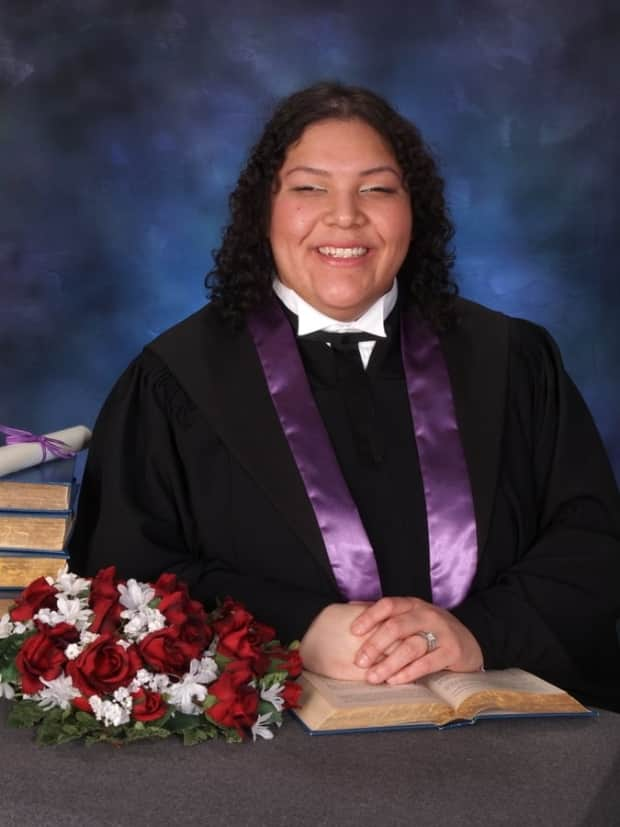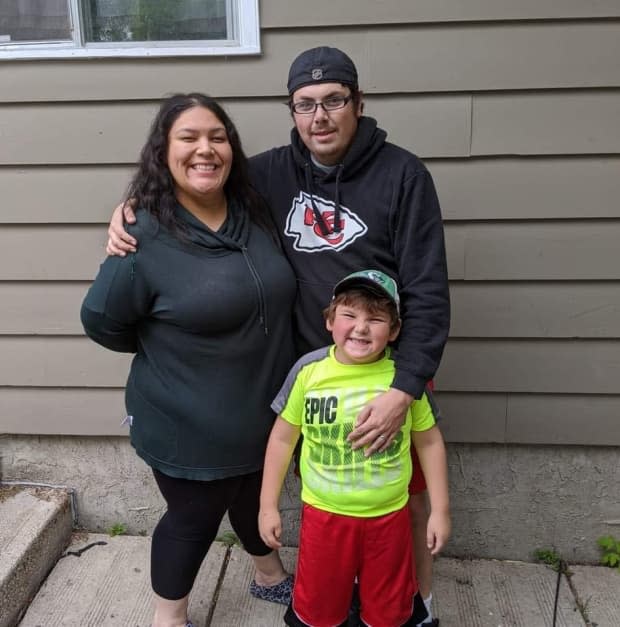Student graduates from ITEP at the University of Saskatchewan after losing vision

Despite completely losing her eyesight, Stella Wilm kept working toward her goal of becoming an educator — a journey that started 12 years ago when she first applied to the University of Saskatchewan.
When Wilm was a toddler she got into a car accident, which damaged the right side of her body. That is probably what then caused Wilm's lung to collapse later in life, her doctors told her. She had to be put on 24/7 oxygen, and the nerves in her eyes became swollen. Eventually, she lost her eyesight.
Despite these challenges, Wilm went on to complete her bachelor of education degree. She had first applied to the University of Saskatchewan in 2009, and again in 2012, but had to withdraw twice.
She enrolled in the Saskatchewan Indian Institute of Technology (SIIT) and was completing the diploma there when she started having vision problems.
Afterward, when she applied to ITEP — the Indian Teacher Education Program at the University of Saskatchewan — she had completely lost her vision.
Wilm spoke with CBC Saskatchewan about her education journey. This conversation has been edited for length and clarity.
CBC: What does it feel like to have now graduated?
Wilm: That felt surreal. I was very happy and sad. Mostly happy, but sad because I was closing that chapter of my life.
What was it like for you when you started having vision problems?
I couldn't see the ground. I just couldn't see it when I looked down, it was blurry it was dark like hazy. And I think at that point I was in a lot of denial. I figured I didn't want to think about that too much. I just remember thinking, it's not right, but it's going to be fixed. It's going to be OK.
And then I just kept up with my schoolwork and kept doing what I can for school and managing with oxygen. I didn't want to think about it. I kept telling myself it was going to be fine, my doctors are going to figure it out.
How were you still able to study if you couldn't see the ground?
I basically had almost perfect vision with my glasses on ... that's how it was in my schooling, I was still able to do my tests perfectly fine, for the majority of the time. But as my vision started going more and more, it got harder to study.
I remember it was like reading through a straw. I had to really focus.... It was with my practicum towards the end when I struggled at that point ... I was pretty much probably 85-90 per cent blind maybe. I wasn't able to walk from one side of the school to the other side ... I basically couldn't really see anything.
Was there anyone there to help you move around?
No, because at that point we never, they never knew how bad it was. I wasn't really vocal about it. Like I knew how bad it was and my mom knew how it was. I think in her frame of mind, she didn't know the extent of it. And I think she may have been part of denial, too.
So she was was dealing with everything, like it is a big adjustment for everybody from going on oxygen to me losing my sight and it just getting worse. But we never really knew how bad it was. And I think we all thought it was going to come back.

How were you feeling in that situation?
I was so immersed in my studies, but I didn't really give myself time to think about the future or think about what was actually happening. So I wasn't, I think I was deflecting. I was, of course, I was hurt.
Can you tell me about what it was like starting out at ITEP and being visually impaired?
The biggest adjustment was finding work that was accessible. For the first semester, they gave me digital formats of my textbooks, but my computer program — there was no perfect way of reading the textbooks digitally. Sometimes it would jump from one page to the middle of the book, or sometimes it wouldn't even read the pages. So we had to figure out how to properly get the textbooks accessible for me.
What was the vibe like from faculty and students at ITEP?
It was amazing.They basically became like my, I call them my "ITEP family," because they really became my support system. And I know if I didn't advocate for myself, they would advocate for me. But they never needed to because I had to learn how to advocate for myself having my disability. I had to learned how to really stick up for myself and what I needed. I always knew what I needed. .. and so I really learned how to be vocal about that kind of stuff.
After having gone what you've been through do you think it'll affect how you teach?
Yes, the way I feel through everything is I knew what I wanted. I knew I had a choice. I make my choices. I'm a firm believer in going for what you want and working for it. If you really, really want something you have to work for it.
I see that with my teaching as well when I'm working with my students. I welcome them, I talk to them, I'm honest with them about about my life and my goals…. And of course right from the beginning I was informative and educated them on my disability, how I'm going to manage as a teacher, and what my job is as a teacher and what their job are as students.
What do you want others to take away from your story?
Probably just to not be afraid to take risks on yourself, and be patient.

